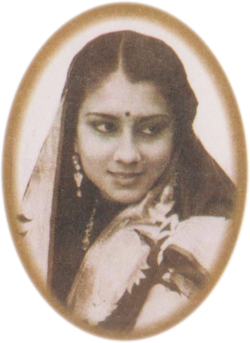Top Qs
Timeline
Chat
Perspective
Vijaya Raje Scindia
Rajmata of Gwalior (1919–2001) From Wikipedia, the free encyclopedia
Remove ads
Vijaya Raje Scindia (born Lekha Divyeshwari Devi; 12 October 1919 – 25 January 2001), known popularly as the Rajmata Scindia, was an Indian politician and consort of the last ruling Maharaja of Gwalior, Jiwajirao Scindia, in British Raj. In later life, she was elected repeatedly to both houses of the Indian parliament. She was one of the founding members of the Bharatiya Janata Party.[6] William Dalrymple wrote in his 1998 book The Age of Kali that she had been called "a madwoman and a saint; a dangerous reactionary and a national saviour; a stubborn and self-righteous old lunatic and a brave and resilient visionary."[7]
This article needs additional citations for verification. (February 2019) |
Remove ads
Early years
Vijaya Raje Scindia was born in 1919 at Sagar in present-day Madhya Pradesh, the eldest child of Thakur Mahendra Singh of Kotla State (U.P.), a government officer, by his second wife, Chuda Devashwari Devi.[citation needed] She was named Lekha Divyeshwari Devi at birth. Her father was a deputy collector in the provincial administration. Her mother was the daughter of former Commander-in-chief of the Nepalese Army Khadga Shamsher Jang Bahadur Rana, the nephew of founder of Rana dynasty of Nepal, Jang Bahadur Kunwar Rana. She died at Vijaya Raje's birth. Her brother is Dhyanendra Singh, husband of Maya Singh.[8]
Remove ads
Personal life
In February 1941,[9] at the age of 22, Lekha was married to Jiwajirao Scindia, Maharaja of Gwalior, one of the largest, richest and highest-ranking princely states in India.
Children
Vijaya Raje and Jiwajirao had four daughters and a son:
- Padmavati Raje 'Akkasaheb' Deb Barman (1942–64), who wed Kirit Bikram Kishore Deb Barman, the 185th ruling Maharaja of Tripura.
- Usha Raje Rana (born 1943), who wed Pashupati Shamsher Jang Bahadur Rana of the Rana dynasty, Nepalese politician and grandson of the last Maharajah of Nepal. They are the parents of Devyani Rana and Urvashi Rana.
- Madhavrao Scindia (1945–2001), Indian politician belonging to the Indian National Congress and former Union Minister of Railways, Aviation and Human resources development, and the titular Maharaja of Gwalior. He is the father of Jyotiraditya Scindia.
- Vasundhara Raje (born 1953) BJP politician and a two-term Chief Minister of Rajasthan. She was formerly married to the titular Maharaja of Dholpur.
- Yashodhara Raje Scindia, formerly Sports Minister of Madhya Pradesh
Remove ads
Politics
Summarize
Perspective

Vijayaraje was initiated into electoral politics in 1957 when she contested and won the Guna Lok Sabha seat in Madhya Pradesh on a Congress ticket. Five years later, she won on a Congress ticket from Gwalior. Later, she quit the Congress and won the Guna seat in 1967 on Swatantra Party's ticket. She soon joined Bharatiya Jan Sangh and resigned from Lok Sabha to take part in state politics. She won the Karera assembly seat in Madhya Pradesh as the Jan Sangh candidate in 1967 and actively engaged in state politics. Jan Sangh defied the Indira-wave in the 1971 Lok Sabha polls to win 3 seats in Gwalior region – Vijaya Raje Scindia from Bhind, Vajpayee from Gwalior and Madhavrao Scindia from Guna, though he later left the party.[10] Vijayaraje Scindia did not contest Lok Sabha elections in 1977 and 1984 and lost to Indira Gandhi in Rae Bareli in 1980. In 1989, she won from Guna as member of Bharatiya Janata Party (BJP), and retained the seat in 1991, 1996 and 1998. She did not contest the elections in 1999 due to old age. She was jailed by Indira Gandhi during the Emergency, ultimately sharing a cell with fellow Rajmata and MP, Gayatri Devi, in Tihar Jail. In the 1970s, Vijayraje and her son Madhavrao were involved in a public dispute over property. Animosities heightened due to their differing political ideologies.
Vijayaraje came to the forefront of the BJP leadership in 1980 when she was made one of its vice-presidents. She played a key role in popularizing the party's Ram Janmabhoomi movement and was considered a hardliner. Following the demolition of the Babri Masjid in December 1992, she had declared that "she could now die without any regret, for she had seen her dream come true."[11] She remained a BJP vice-president until 1998 when she stepped down on health grounds and quit electoral politics. She died in January 2001.
Ancestry
Remove ads
References
Further reading
Wikiwand - on
Seamless Wikipedia browsing. On steroids.
Remove ads

